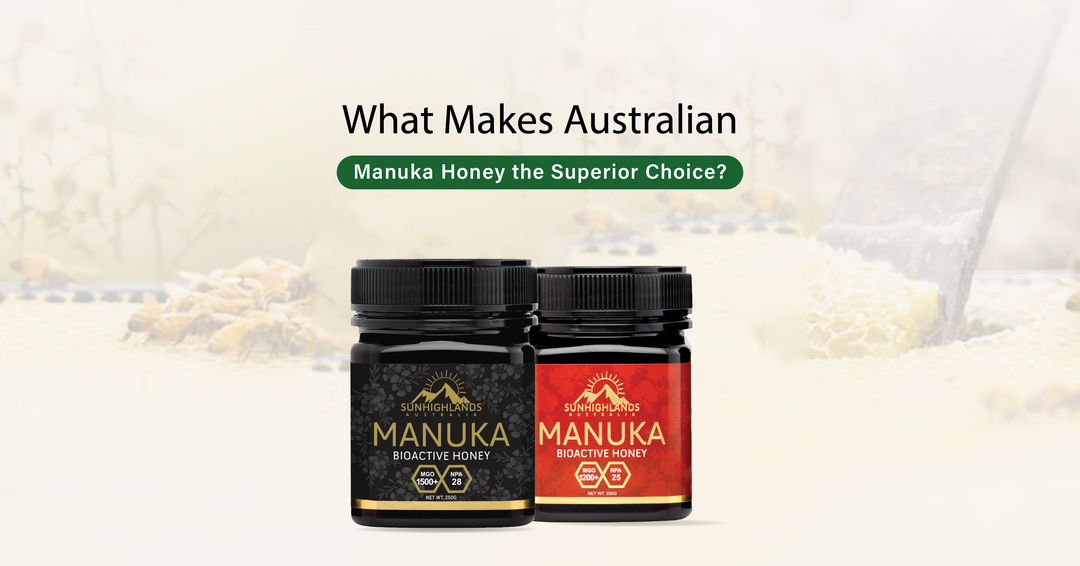Antibacterial Power of Manuka Honey: Discover the Benefits

Experts consider Manuka honey a highly potent remedy found in natural products. The substance goes beyond being an ordinary sweetener because its antibacterial properties support numerous health advantages. The antibacterial properties of Manuka honey attract numerous patients who use it for treating wounds, stomach health management, and resisting infections.
What specific quality of Manuka honey produces its antibacterial nature? This piece will analyze Manuka honey's distinctive attributes and establish how they support health benefits.
Is Manuka Honey Antibacterial
Manuka honey is antibacterial. The substance demonstrates intense antibacterial characteristics. Science shows that the antibacterial properties of Manuka honey supersede traditional honey's antibacterial capacity. The antibacterial properties of regular honey stem from hydrogen peroxide molecules that exhibit gentle antibacterial behaviour.
The primary factor providing manuka honey with antibacterial effectiveness stems from its elevated MGO content. The higher the MGO level, the stronger the Manuka's antibacterial action.
Manuka Honey as a Natural Antibiotic
Medical experts label Manuka honey a natural antibiotic because it combats bacterial infections without provoking the same adverse effects as prescription antibiotics. The medical properties of Manuka honey provide effective treatment for minor infections, though they differ slightly from pharmaceutical antibiotic methods.
Some distinct elements in Manuka honey destroy harmful bacteria throughout the body yet preserve beneficial microorganisms. The safe composition of this honey provides a better option for fighting infections by preserving the body's microbiome equilibrium.
Honey’s Antibacterial Power
Only Manuka honey exhibits the most potent antibacterial properties among various types of honey. Scientific research proves that Manuka honey creates enough antibacterial effects to fight against Staphylococcus aureus, Escherichia coli (E. coli), and Helicobacter pylori, which cause stomach ulcers. Manuka honey has a wide range of applications because it fights infections that develop inside and outside the body.
Does Manuka Honey Kill Good Bacteria?
The public often questions if Manuka honey can destroy helpful bacteria within the human body. The antibacterial properties of Manuka honey remove dangerous bacteria without damaging beneficial gut or skin microorganisms. Tests have validated that Manuka honey lacks the killing capacity for helpful bacteria.
Manuka honey has health benefits because it encourages the development of essential good bacterial growth within your digestive tract. The honey assists your body in retaining natural bacterial balance, which enables you to defend against infections effectively.
Manuka Honey and Inflammation
Numerous people remain unaware of how Manuka honey performs as an anti-inflammatory agent. When patients apply Manuka honey to their skin surface or ingest it through swallowing, the substance plays an anti-inflammatory role.
People experience good results with Manuka honey because it reduces swelling, redness, and pain in their skin and throats. The healing substance reduces inflammation, speeding up patient recovery and building skin health.
Manuka Honey Antiviral Properties
Along with its antibacterial properties, Manuka honey has antiviral properties. Antiviral applications of manuka honey assist immune system functions when fighting colds and flu viruses. Its consumption allows people to lessen their symptoms while shortening their healing time. The utilization of Manuka honey provides complementary benefits to your immune system but cannot eliminate viral infections.
Manuka Honey Antibacterial Infection
The antimicrobial effects of Manuka honey fight fungi and other dangerous microorganisms, in addition to its known antibacterial and antiviral capabilities. Medical providers utilize Manuka honey to treat fungal infections yet employ its antimicrobial capabilities to oversee dangerous microbes in oral cavities.
What is Manuka Honey Good For?
Benefits to the Immune System
Manuka honey is a healthy addition to your daily routine. You can take it as it is or enjoy it with your favourite salad bowl. The anti-inflammatory and antimicrobial properties of Manuka honey help fight infectious diseases and kill pathogens. Its antioxidative property also boosts the immune system by protecting the body from damage by free radicals. Free radicals can accelerate the aging process and promote chronic diseases. Manuka honey helps fight against free radicals and promotes overall health. It enhances the activity of crucial components of our defence system, such as macrophages and neutrophils, promoting overall health and well-being.
Benefits of Oral Health
The uniqueness of Manuka honey from other natural honey is due to the presence of methylglyoxal (MGO), which is responsible for its antibacterial properties. These properties help maintain good oral health by fighting harmful bacteria such as Streptococcus mutants in the oral cavity, protecting against cavities. They also favour clean, healthy teeth and gums by inhibiting plaque formation and preventing bad breath (halitosis).
Helps in Wound Healing
Manuka honey is known to be a natural wound healer and has been used for centuries as a home remedy. Its antibacterial properties help fight or prevent bacterial infections, while its anti-inflammatory properties decrease swelling, redness, and itching around wounds. Manuka honey reduces scars and promotes tissue regeneration, making it excellent for treating burns, ulcers, and chronic wounds. This healing property has become active in many wound care products like gels and dressings.
Benefits to Digestive Health
The anti-inflammatory nature of Manuka honey helps prevent the development of many chronic health conditions, including digestive health. Chronic inflammation can lead to numerous intestinal disorders like inflammatory bowel disease (IBD) and irritable bowel syndrome (IBS). Regular intake of Manuka honey can reduce inflammation in the digestive tract, alleviating symptoms like pain, cramps, and irregular bowel movements. Its antibacterial properties are important in killing bacteria like Helicobacter pylori, which cause gastric ulcers, thereby maintaining healthy gut flora and promoting gut health.
Benefits to Respiratory Health
Consumption of Manuka honey can help fight respiratory problems like bronchitis, sinusitis, and common colds due to its antibacterial nature, attributed to the presence of MGO. Manuka honey may also help with seasonal allergies due to its anti-inflammatory properties, treating symptoms like sneezing, coughing, wheezing, and shortness of breath. During a common cold, taking one tablespoon of Manuka honey with lukewarm water can soothe the respiratory tract, eliminate symptoms like coughing and shortness of breath, and help ensure a long, peaceful sleep.
Benefits to Skin
Manuka honey is a significant part of the skincare industry because of its antibacterial and anti-inflammatory properties. These properties help prevent acne and reduce redness, itching, and swelling caused by eczema and psoriasis. Manuka honey boosts collagen production, maintaining the skin’s elasticity and slowing the appearance of wrinkles. Being humectant helps retain skin moisture, protecting it from drying and making it young, radiant, and smooth.
Conclusion
Manuka honey is an all-rounder and an effective addition to your daily routine, providing numerous medical and health benefits. Its anti-inflammatory, antimicrobial, antioxidant, and antibacterial nature makes it a priceless addition to home remedies and medicines. It supports and boosts your immune system, promotes healthy, radiant skin, reduces signs of ageing, and acts as an immediate energy source. Regular intake of Manuka honey can improve your overall health and fitness.
FAQs
Is Manuka honey good for you?
Manuka honey is extremely good for your overall health due to its antibacterial and anti-inflammatory properties.
What are the benefits of Manuka honey?
Manuka honey provides countless benefits to skin, respiratory, and digestive health.
How do you identify the best quality Manuka honey?
The quality of Manuka honey is identified based on methylglyoxal (MGO) levels. The higher the levels of MGO, the better the quality of the honey.
Is Manuka honey antibacterial?
The antibacterial attributes of Manuka honey advance the substance into antibacterial honey with stronger potency than conventional honey. The antibacterial capabilities stem from MGO, which exists in this type of honey.
What are the antibacterial properties of Manuka honey?
Manuka honey's antibacterial activity targets dangerous body bacteria yet protects positive microorganisms so that they remain untouched.
Is Manuka honey an antibiotic?
The antibacterial properties of Manuka honey make it a therapeutic agent that defeats infections without destroying beneficial body bacteria.
Is people employ Manuka honey to treat viral infectious conditions?
Manuka honey demonstrates antiviral actions to decrease viral infection symptoms, yet it does not fully recover from cold and flu symptoms.





